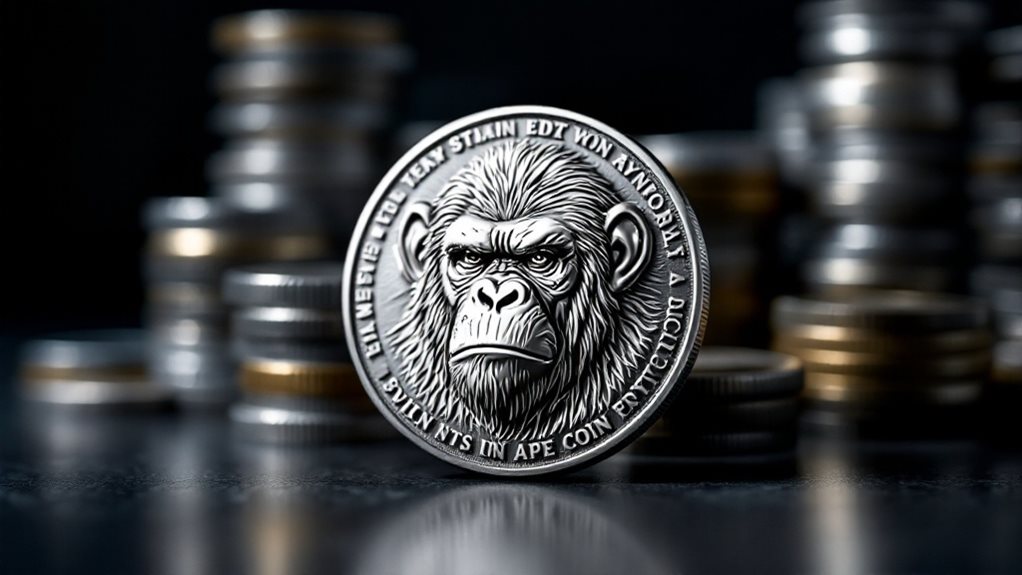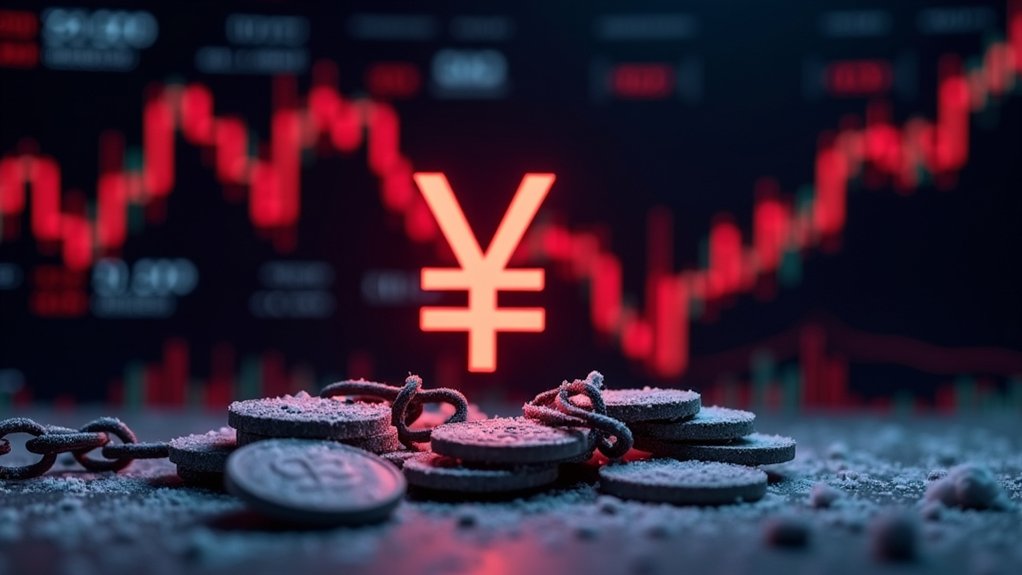APEcoin (APE) is a digital token launched in March 2022 on the Ethereum blockchain. It’s the main currency for the Bored Ape Yacht Club NFT ecosystem and is governed by a decentralized autonomous organization (DAO). The token lets holders vote on community decisions, access exclusive events, and make transactions within the ecosystem. With a fixed supply of 1 billion tokens, APE is expanding its use across gaming, digital commerce, and Web3 projects. There’s much more to discover about this unique cryptocurrency.
Quick Overview
- APEcoin is an ERC-20 cryptocurrency token built on Ethereum that serves as the primary currency for the APE ecosystem.
- It functions as a governance token for ApeCoin DAO, allowing holders to vote on important ecosystem decisions.
- APE has a fixed supply of 1 billion tokens and integrates with LayerZero for cross-chain functionality.
- The token is closely associated with the Bored Ape Yacht Club NFT collection and enables access to exclusive events.
- APEcoin can be used for gaming rewards, NFT purchases, and various Web3 applications across digital commerce.

APEcoin is a digital token that burst onto the cryptocurrency scene in March 2022. It’s an ERC-20 token built on the Ethereum blockchain and serves as the main currency for the APE ecosystem. The token is closely tied to the popular Bored Ape Yacht Club NFT collection and has quickly become a significant player in the Web3 space. The project is overseen by a decentralized autonomous organization that ensures community-driven development.
As a governance token, APE lets holders participate in the ApeCoin DAO, where they can vote on important decisions that shape the ecosystem’s future. It’s not just about voting though – APE serves multiple purposes, including being a utility token for various transactions within the ecosystem. Token holders can access exclusive events, services, and participate in community-driven projects. The token distribution includes 62% to ecosystem fund to ensure sustainable long-term development.
The technical foundation of APEcoin is built for scalability and interoperability. There’s a fixed supply of 1 billion APE tokens, which means no more can ever be created. The token uses a Delegated Proof of Stake consensus mechanism and works with LayerZero to enable cross-chain transactions. It also acts as the native gas token on ApeChain, making it crucial for processing transactions on that network.
APE’s real-world applications are diverse and growing. Gamers can earn it as rewards in play-to-earn games like Benji Bananas, while collectors can use it to buy and sell NFTs in various marketplaces. The token is also accepted as payment for official Bored Ape Yacht Club merchandise and events, showing its practical utility beyond just trading.
The ecosystem continues to expand through third-party Web3 projects that integrate APE into their platforms. These integrations range from gaming environments to metaverse projects, where APE serves as a primary currency for virtual transactions and experiences. The token’s smart contract functionality allows developers to create new applications and services that utilize APE in creative ways.
The APE ecosystem represents a blend of entertainment, gaming, and digital commerce. It’s designed to be user-friendly, allowing people to participate in the growing world of Web3 without needing deep technical knowledge.
While the token started with strong ties to the Bored Ape Yacht Club, it’s evolved into a versatile cryptocurrency that serves multiple purposes across different platforms and applications. Its integration into various aspects of the digital economy shows how cryptocurrency can bridge the gap between traditional commerce and the emerging digital frontier.
Frequently Asked Questions
How Do I Stake APECOIN to Earn Rewards?
Staking ApeCoin can be done through ApeStake.io, the official staking platform.
Users need to first get APE tokens from a crypto exchange and have a compatible wallet like MetaMask. They can then connect their wallet to ApeStake.io and choose from four staking pools: APE-only, BAYC, MAYC, or BAKC Paired.
There’s no lock-up period, and tokens can be added or removed anytime. Standard Ethereum gas fees apply.
What Wallets Are Compatible With Storing APECOIN?
ApeCoin can be stored in several types of digital wallets.
Hardware wallets like Ledger Nano and Trezor Model T offer secure offline storage.
Popular software wallets include MetaMask and Trust Wallet.
Mobile options feature Atomic Wallet and Exodus.
Web3 wallets such as WalletConnect and Fortmatic also support APE tokens.
There’s plenty of choice between hardware, software, mobile, and web3 solutions for storing ApeCoin.
Is APECOIN a Good Investment for Long-Term Cryptocurrency Holders?
APEcoin’s long-term potential is linked to its ecosystem’s growth in Web3, gaming, and the metaverse.
It’s backed by Yuga Labs and has partnerships with major brands.
The token’s price has been volatile, moving from $1 at launch to $39.40, and back down to around $1.14 in 2024.
While forecasts predict possible growth, the token faces risks from market trends, regulations, and competition in the crypto space.
Can APECOIN Be Mined Like Bitcoin?
ApeCoin can’t be directly mined like Bitcoin. It’s an ERC-20 token on the Ethereum blockchain with a fixed supply of 1 billion tokens.
While traditional mining isn’t possible, some people use platforms like unMineable to indirectly acquire APE. This process involves mining other cryptocurrencies like Monero or Ethereum, which are then automatically converted to APE tokens.
However, this method isn’t as efficient as buying APE directly from exchanges.
What Determines Apecoin’s Daily Price Fluctuations?
APEcoin’s daily price changes are influenced by several key factors.
Market sentiment and crypto trends affect how traders feel about buying or selling.
The NFT market‘s health plays a big role since APE is closely tied to NFT projects.
Trading volume and large transactions can cause quick price movements.
News about partnerships, regulations, or new features in the APE ecosystem can also push prices up or down.





